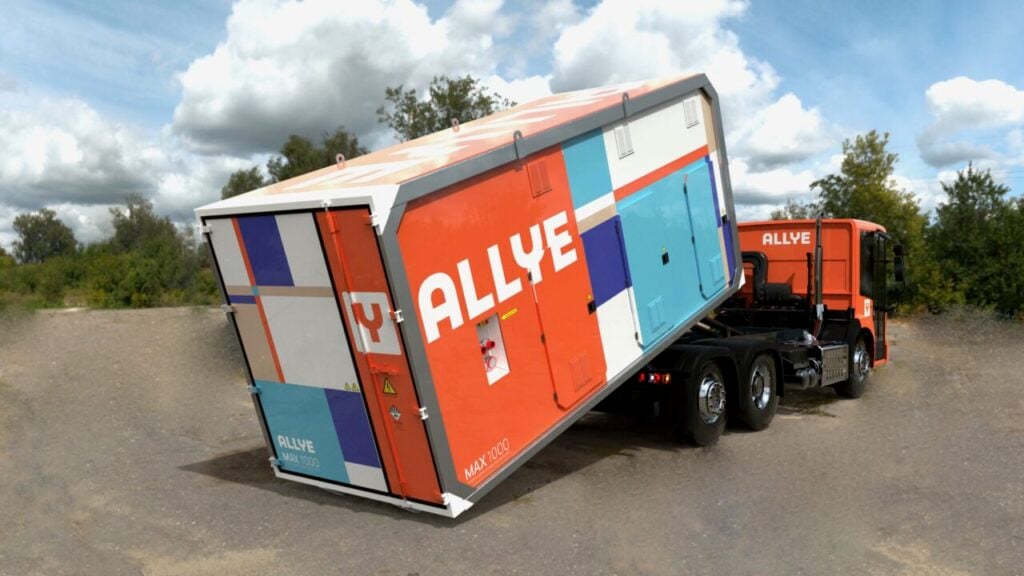British green-tech start-up Allye Energy has launched a new high-capacity battery energy storage system (BESS) that uses repurposed EV battery packs with mixed chemistries.
The MegaMAX range, MAX1000 and MAX1500, comprise up to 18 EV batteries in a self-contained, modular ‘drop and go’ solution that looks to circumvent the delays associated with grid upgrades.
The MAX1000 provides 1MWh storage with up to 840kW of power, while the higher-capacity MAX1500 delivers up to 1.5MWh and up to 1.25MW of power. Each MegaMAX integrates three Allye MAX300 structures into an integrated, functional system with inherent redundancy, featuring a fully liquid-cooled thermal management system.
One use case for the systems is as a buffer for EV charging where the grid is constrained, something Connected Energy, another company that repurposes end-of-life EV batteries for storage, has pitched as the solution to supporting charging for electric HGVs.
Allye states that 50-80% of electrification projects face severe power constraints. The electrification of transport, which the Climate Change Committee (CCC) sees underpinning the UK’s carbon budgets, faces the same grid connection hurdle that renewable energy generation and storage projects in the UK do.
To encourage EV uptake and support the automtovie industry, chief executive of the Society of Motor Manufacturers and Traders (SMMT) Mike Hawes has called on the government to implement the same connection accelerating mitigation measures to EV charging as it has solar and wind developments.
In January last year, Allye partnered with SYNETIQ, a vehicle salvage, dismantling and recycling company, to use batteries from SYNETIQ in its MAX range.
The MAX storage systems use nickel-manganese-cobalt (NMC) and lithium iron phosphate (LFP) battery chemistries. Last year, Jack Levy, Allye COO told Current± that the firm intends to integrate solid state, as well as cobalt free lithium-ion chemistries, ”with an eye also on eliminating lithium all together as EVs move to sodium-ion.”
Energy storage and EV charging
The first product Allye launched was the MAX300, a 300kWh mobile unit that it provided as part of a partnership with Jaguar Land Rover and was used at the Glastonbury music festival last year.
As reported by Energy-Storage.News last year, Allye raised £900,000 in funding primarily from Elbow Beach Capital (£650k), with support from Alpha Future Funds.
At the time, the firm said it was targeting 10,000 MAX units by 2030 with an installed capacity of 3GWh. From that year onwards, it wants to install 5,000 units annually.
At the beginning of this year, as part of a consortium including OST Eastern Switzerland University of Applied Science and Negal Engineering AG, Allye was awarded £650,000 by Innovate UK to develop a modular, portable home BESS.
Connected Energy’s second life EV battery storage system was utilised across two Volvo service workshops after Volvo Trucks’ plans to install high-powered chargepoints were stalled due to neither site having enough import capacity from the grid to power the chargers.
The issue of grid constraints is particularly prominent when charging trucks, which require chargepoints that can be up to 50 times more powerful than fast chargers for cars.
Connected Energy also plans to develop grid-scale BESS using repurposed batteries from electric buses.
Other types of energy storage are also being deployed to support the grid in EV charging applications, with a commercial trial underway of use of a flywheel energy storage system (FESS) for high-powered EV charging along the UK’s motorway network.
Levistor is providing the technology, which is being tested in collaboration with National Highways for use in areas where current grid infrastructure is unable to support rapid and ultra-rapid EV charging.






